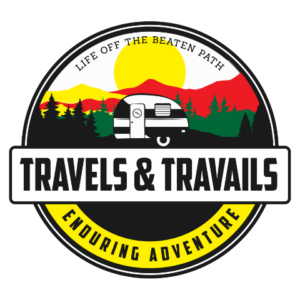Boondocking, also known as dry camping, free camping, or camping off-grid, is a popular way for RVers to explore the great outdoors while enjoying the comfort and convenience of their own home on wheels. But one question that often comes up among boondockers is, “How long can you boondock in an RV?”
You can boondock in an RV until you run out of resources, like water and power, or until you fill your grey or black tanks. Depending on your RV’s size and configuration, this generally happens between a few days to a couple of weeks.
In this article, we’ll explore the factors that determine how long you can boondock in an RV and some tips for extending your stay.
RV Resources
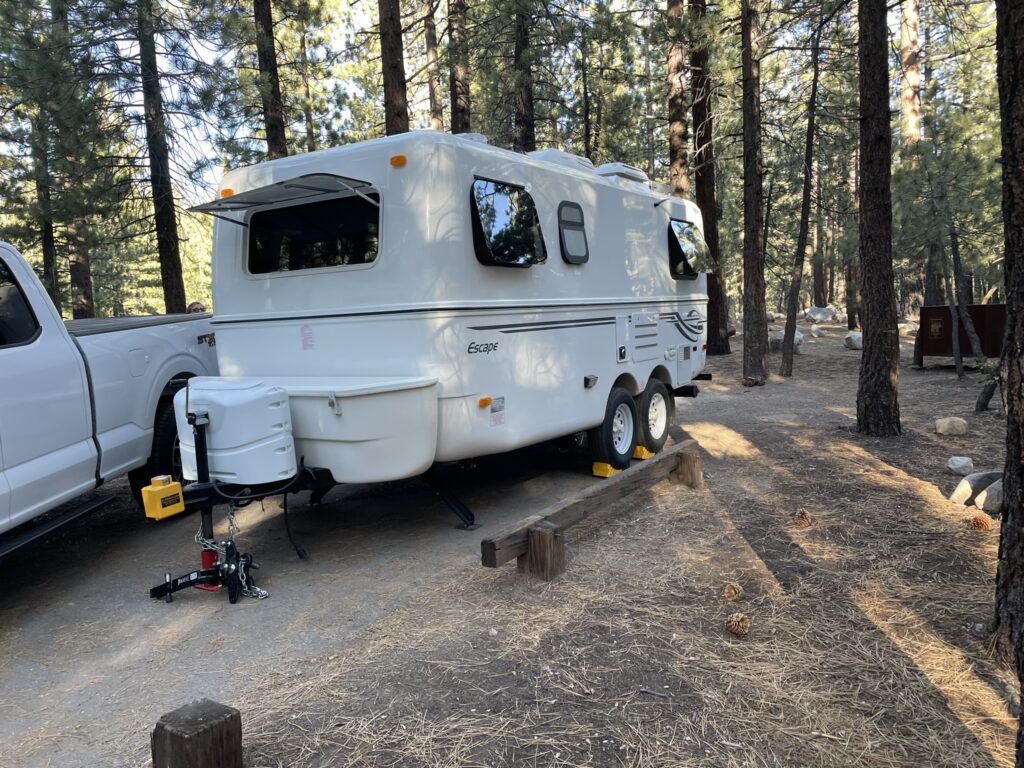
When you’re planning a boondocking trip, consider the type of RV you have. Each RV has its own capabilities and limitations when it comes to boondocking. For example, smaller RVs like truck campers or pop-up trailers may have limited water and power storage, so you’ll need to be careful about how much you use and plan accordingly. Larger RVs, on the other hand, may have more room for tanks and batteries, which can allow for longer stays in one spot.
Another important factor to consider is your RV’s power and water systems. Many RVs are equipped with solar panels or generators that allow you to generate your power while boondocking. However, these systems have a limited capacity, and you’ll need to be mindful of how much power you’re using and how much you have left. Similarly, you’ll need to be mindful of your water usage and ensure you have enough to last for your stay.
Location
Where you choose to boondock and what amenities are available can also play a role in how long you can stay. Some boondocking spots may not have much in the way of amenities, like no electricity or running water, which can make it harder to stay for longer.
Other boondocking spots may have more amenities, like nearby dump stations or water filling stations, which can make it easier to extend your stay. For example, Quartzsite, a popular boondocking destination has a nearby station where you can empty your waste tanks, fill your water, and get fuel.
Time of Stay
Another thing to consider when planning a boondocking trip is the time of year. In the summer, you’ll likely require more power to run the air conditioner. In the winter, you’ll use more propane and electricity to run the heater.
Stay Out Longer
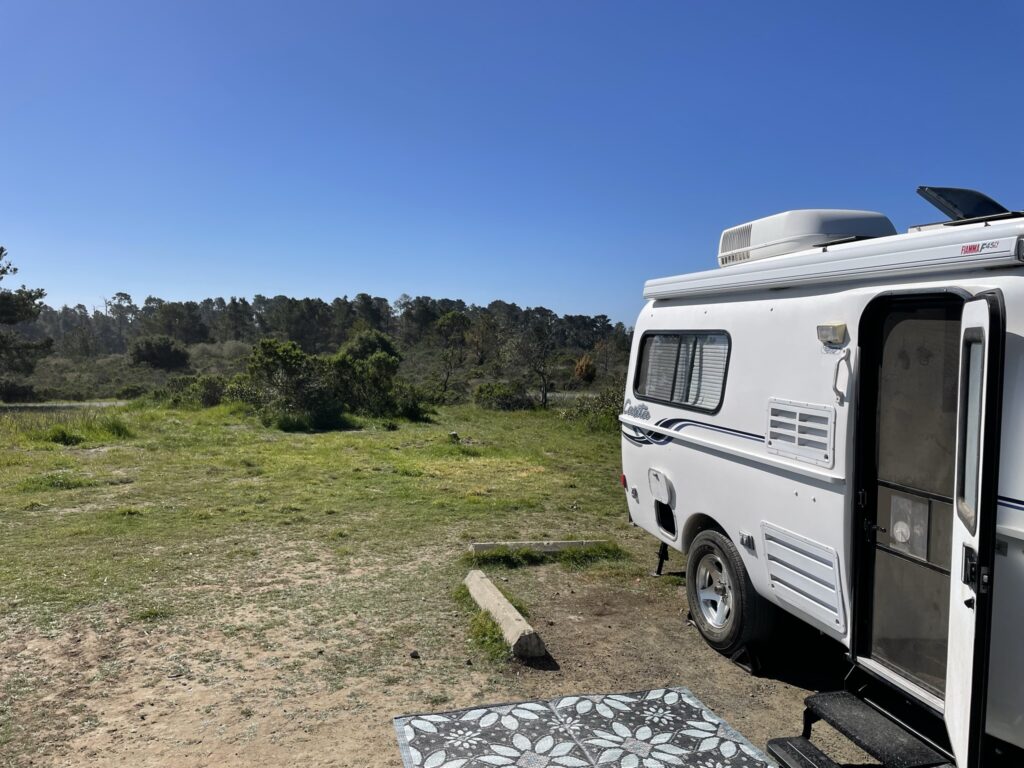
To extend your boondocking stay, you can modify your RV, or choose an RV with components that will keep you out longer.
Batteries
Ultimately, the best type of battery for boondocking will depend on your specific needs and budget. Lithium-ion batteries are considered to be the best option for longer boondocking, but they are also the most expensive. AGM and GEL batteries are good middle-ground options and are more affordable than Lithium-ion batteries. Make sure you have a good quality battery as it will help you store more energy and last longer.
Several types of batteries are well-suited for longer boondocking in an RV. The most commonly used are as follows:
Lead-Acid batteries
Lead-acid batteries are the most traditional type of deep-cycle batteries used for decades in RVs and other off-grid applications. They are relatively inexpensive and widely available, making them a popular choice for boondocking.
When it comes to lead-acid batteries, you have two options: flooded and sealed. Flooded batteries need regular maintenance like adding water to the cells to keep the plates submerged, while sealed batteries don’t require any maintenance at all.
When it comes to flooded lead-acid batteries, you have two options: wet-cell and gel-cell. Wet-cell batteries are cheaper but have a shorter lifespan compared to gel-cell batteries. Gel-cell batteries are sealed, so you don’t have to do regular maintenance on them, but they cost more.
Lithium-Ion batteries
Lithium-Ion batteries are more expensive than lead-acid batteries but have a longer lifespan, require less maintenance, and can be discharged to a much lower level without damage.
Lithium-ion batteries are a newer type of battery technology that has become increasingly popular in RVs and other off-grid applications. They are more expensive than lead-acid batteries but have several advantages that make them well-suited for boondocking.
One of the main advantages of lithium-ion batteries is their longer lifespan, typically around 10-15 years with regular use. They also require less maintenance and can be discharged to a much lower level without damage. They also have a higher energy density which means they can store more energy in a smaller space.
Lithium batteries also have a very low self-discharge rate, which means they lose less energy over time when not in use. This means they can be stored for longer periods without needing to be recharged.
Another advantage of lithium-ion batteries is that they are relatively insensitive to temperature changes, which can affect the performance of lead-acid batteries.
Lithium-ion batteries also have a higher voltage per cell, which means they can produce more power, and they weigh much less than lead-acid batteries which makes them ideal for RVs.
Overall, lithium-ion batteries are a great option for boondocking if you’re willing to invest more money upfront. They offer a longer lifespan, less maintenance, and higher energy density.
AGM (Absorbed Glass Mat) batteries
AGM batteries are a type of lead-acid battery that are often used in RVs and other off-grid applications. They are a step up from traditional flooded lead-acid batteries and are considered a good middle-ground option between lead-acid and lithium-ion batteries.
AGM batteries are sealed and don’t need regular maintenance, like adding water to the cells. They also have a pretty long lifespan, usually around 5-7 years with regular use. They can also be discharged to a lower level without damage, making them perfect for RV usage.
AGM batteries have a number of advantages for boondocking:
- They are widely available and relatively affordable compared to lithium-ion batteries.
- They are sealed and require less maintenance than flooded lead-acid batteries.
- They have a relatively high energy density, meaning they can store a lot of energy in a small space.
- They are also more resistant to temperature changes and vibration compared to flooded lead-acid batteries.
Overall, AGM batteries can be a good option for boondocking if you want a balance between budget and performance. They offer longer lifespans, less maintenance, and higher energy density than flooded lead-acid batteries, but not as much as lithium-ion batteries.
GEL batteries
GEL batteries are a great option if you are looking for a low-maintenance, dependable battery option.
Although GEL batteries have a few key advantages that make them an excellent option for RVers, they share many similarities with AGM batteries.
Because they are sealed, you don’t have to worry about checking and adding water to the cells frequently. In addition, they can be discharged to a lower level without damage, making them ideal for deep cycling applications (such as when you’re boondocking and relying on your batteries to power your systems and appliances).
GEL batteries have a number of advantages for boondocking:
- They are sealed and require less maintenance than flooded lead-acid batteries.
- They have a relatively high energy density, meaning they can store a lot of energy in a small space.
- They are also more resistant to temperature changes and vibration compared to flooded lead-acid batteries.
- They are also more resistant to overcharging and discharging, which means they can handle deep cycling better.
- GEL batteries are also known for their stability and reliability, they are less likely to leak or vent gas.
Overall, GEL batteries can be a good option for boondocking, especially if you have concerns about vibration and temperature changes, they offer a longer lifespan, less maintenance, and higher energy density than flooded lead-acid batteries.
However, they also have some disadvantages to consider:
- They are more expensive than traditional flooded lead-acid batteries, and AGM batteries.
- They are not as widely available as other types of batteries, which can make them harder to find and replace.
- They are sensitive to overcharging, if overcharged they can cause permanent damage to the battery which will shorten its lifespan.
- They also have a lower discharge rate than lithium-ion batteries, which means they may not be able to handle high power loads as well as lithium-ion batteries.
- They also have a lower tolerance to over-discharge, If a GEL battery is over-discharged, it can shorten its lifespan.
So all in all, GEL batteries can be a good option for boondocking, but it’s important to weigh the advantages and disadvantages carefully before making a decision.
Generator
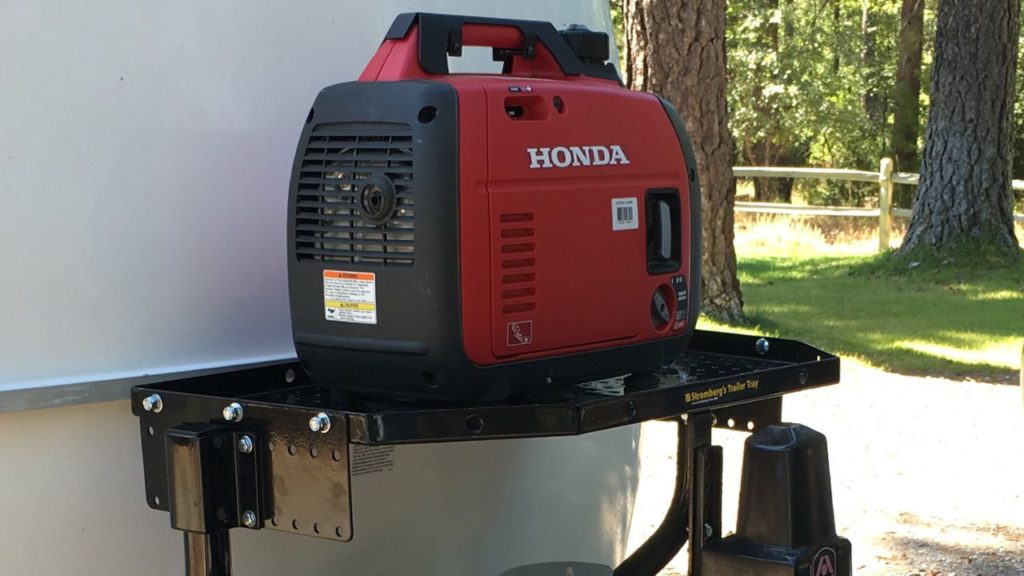
A generator can be a useful tool when boondocking, as it can provide a reliable source of power when no other power source is available. Here are some things to consider when using a generator for boondocking:
- Size: Choose a generator that meets your power needs. This is important when considering the fuel requirements of energy-hungry appliances like air conditioners. A generator that is too small will not be able to meet your power needs, while a generator that is too large will use more fuel.
- Fuel: Consider the fuel type utilized by the generator. Generators powered by gasoline are the most common type, but propane and diesel generators are also available. You won’t have to worry about carrying extra diesel fuel or gasoline with you when you use a propane generator, which is one advantage.
- Noise: Be aware of the generator’s noise level. Out of respect for your fellow campers, choose a generator with a low noise level. If you’re looking for the quietest generator, read the article that I wrote.
- Portability: Take into account the generator’s weight, size, and transportability. You’ll need to have a place to store it while not in use.
- Maintenance: Generators require regular maintenance, such as oil changes, air filter cleaning, and spark plug replacement. Make sure you understand the maintenance requirements of the generator you choose and that you’re able to perform the necessary maintenance.
- Safety: Always follow the manufacturer’s guidelines for the safe operation of the generator and make sure to keep it in a well-ventilated area.
- Cost: Generators can be costly to purchase and operate, so make sure to factor in the cost of fuel, maintenance, and any necessary accessories.
By keeping these factors in mind, you can choose the right generator for your boondocking needs and use it safely and efficiently.
Solar Panels
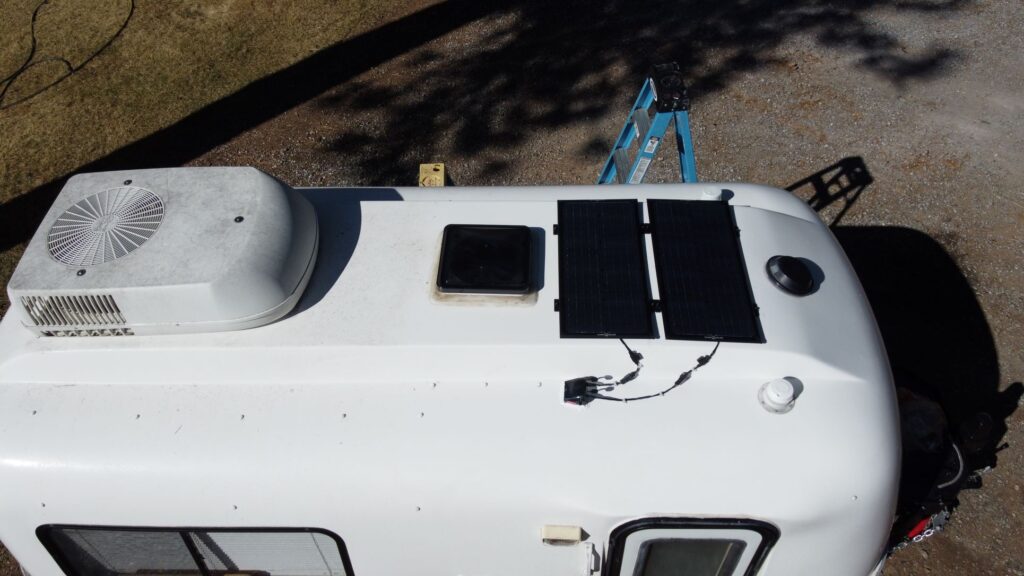
Using solar panels for boondocking is a great way to generate power and stay off the grid for longer periods. Solar panels convert sunlight into electricity, which can be used to power appliances and charge batteries.
There are two primary types of solar panels for boondocking: polycrystalline as well as monocrystalline Monocrystalline panels are more expensive than polycrystalline ones, but they are more efficient and can produce more power per square foot. Although they are less efficient, polycrystalline panels are less expensive.
To determine how many solar panels you need for boondocking, you’ll need to consider your power usage and the size of your battery bank. A general rule of thumb is to have at least one solar panel for every 100Ah battery capacity.
An inverter converts the DC power from the solar panels into AC power that can be used to power appliances and must be connected to a charge controller, which controls the amount of power that goes into the batteries.
While using solar panels for boondocking can be a great way to generate power and stay off the grid for longer periods, there are some limitations to consider:
- Weather: Solar panels rely on sunlight to generate power, so they may not be effective during periods of overcast weather or in areas with limited sunlight.
- Power usage: The amount of power that can be utilized by the solar panels is limited by the tilt angle of the panels and the amount of sunlight available. It’s important to choose a system that can keep up with your power demands.
- Storage capacity: Power generated by solar panels during daylight hours will be wasted if you do not have a sufficient battery bank to store it. It is essential to strike a good balance between the size of your battery bank and your solar panel array.
- Cost: Solar panels and the equipment needed to set up a solar power system can be expensive, especially if you’re looking for high-quality and efficient components.
- Maintenance: Solar panels need to be kept clean and free of debris to work efficiently, and the equipment should be checked and maintained regularly to ensure optimal performance.
- Limited power production at night: Since the solar panels rely on sunlight to generate power, they will not produce power during the night time, which can be a problem if you’re planning to use power at night.
- May not power all equipment: To power energy-hungry appliances, like air conditioners, you’ll need many solar panels and a large bank of batteries.
Overall, using solar panels for boondocking can be a great way to generate power, but it’s important to be aware of the limitations and plan accordingly to ensure that you have a reliable and efficient power system.
Power Devices
Use energy-efficient gadgets, switch to LED lights, and remember to unplug appliances when you’re not using them to save some energy.
Most newer RVs come equipped with LED lights, but if you are purchasing a used RV, you may have to retrofit your existing lights with LED lights.
Water Management
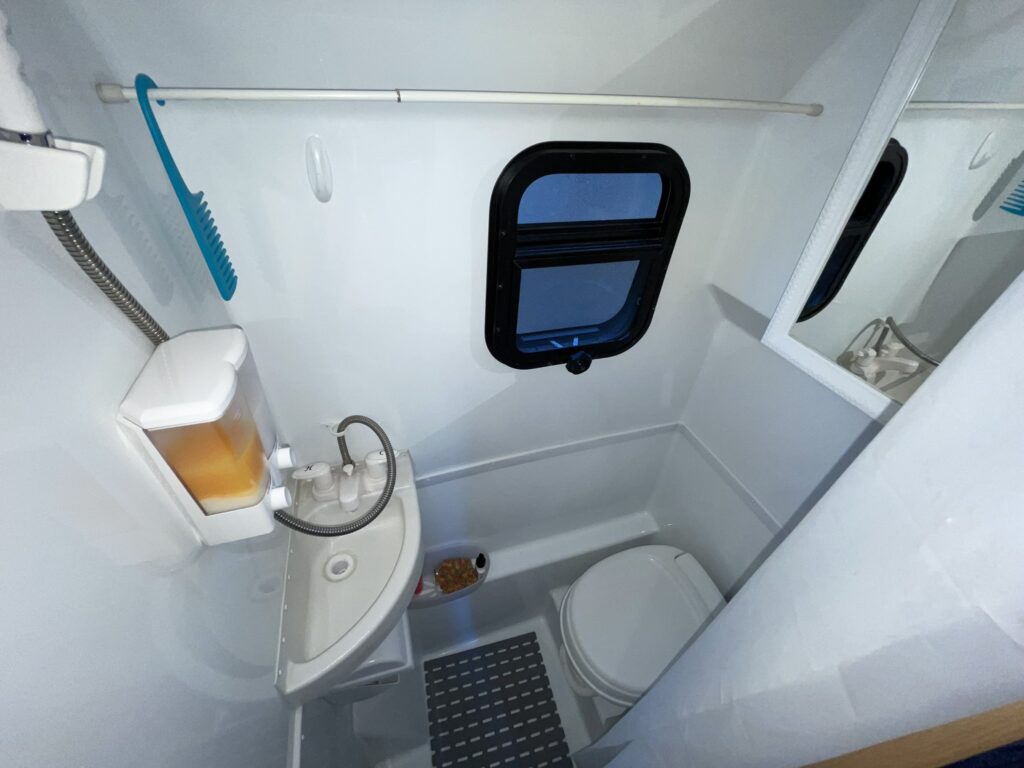
When you’re out in the wild, aka boondocking, it’s important to keep an eye on your water usage. That way, you’ll have enough to last the whole trip. Here are some tips to help you save water:
- Plan ahead: Research the location where you’ll be boondocking and find out if there’s a water source nearby. If not, make sure to bring enough water to last for the duration of your trip.
- Collect rainwater: If you’re boondocking in an area where it rains, set up a system to collect rainwater and store it in a tank for later use.
- Use a low or no-water toilet: Toilets are one of the biggest water users in an RV, so consider using a toilet that uses minimal to no water. If you’d like to know more about low-water usage toilets, read this article that I wrote.
- Take shorter showers: Limit the amount of time you spend in the shower and use a low-flow shower head to conserve water.
- Use a bucket or bowl to wash dishes: Instead of washing dishes under running water, use a bucket or bowl to wash dishes and use grey water for flushing the toilet.
- Fix leaks: Check for leaks in your RV’s plumbing and fix them as soon as possible to prevent water waste.
- Be mindful of your water usage: Be mindful of how much water you’re using and try to limit your usage as much as possible.
- Use a water filter: Use a water filter to purify water from natural sources like lakes, rivers, and streams, so you don’t have to bring as much water with you.
- Wash clothes sparingly: Consider washing only underwear during your trip. Save the rest of the laundry for your next visit to a town with a laundromat.
- Use a solar shower: A solar shower is a great way to conserve water while still being able to take a shower, it uses the sun’s energy to heat the water. Plus, it’s fun to shower outside on a warm day.
- Be mindful of water usage in cooking: Use a pot with a lid when cooking to reduce the amount of water needed, and save the water used for cooking for other uses such as cleaning or washing dishes.
By following these tips, you can manage and conserve water while boondocking, ensuring that you have enough water to last for the duration of your trip.
Propane
Be mindful of your propane usage by using propane appliances only when necessary and choosing more efficient appliances.
RV Insulation
Lastly, consider upgrading your RV’s insulation, windows, and sealing to help retain heat in the winter and keep cool air inside during the summer.
Conclusion
How long you can boondock in an RV depends on a variety of factors including the type of RV you have, your power and water systems, the location and amenities of your boondocking spot, the time of year, and how much you’re willing to conserve and plan. With the right mindset, equipment, and preparation, you can enjoy boondocking for longer.
